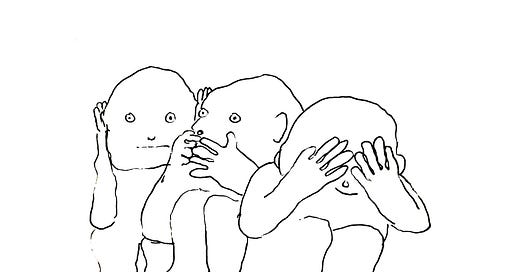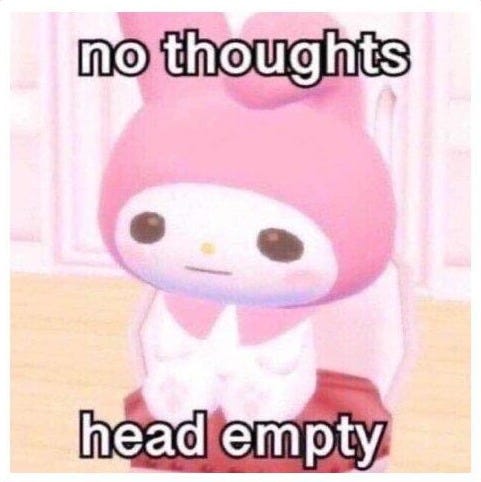The Age of Withdrawal: what happens when humans just ‘give up’?
Trouble is brewing at the crossroads of comfort, existential dread, and endless stimulation
I don’t remember when I was first infected, viruslike, by the concept of withdrawal. At some point over the last two years, it’s come to occupy a growing space in my brain, describing a common thread in a group of loosely-connected phenomena spanning technology, art, media, gaming, sex and relationships, politics, climate, and design. Since my early 20s, I’ve worked for a fashion and culture magazine; against the backdrop of an ever-accelerating trend cycle my brain has been rewired to spot patterns and give them a name. But this concept, withdrawal, seems more fundamental somehow. It just keeps growing, taking root, covering more ground. Sprawling out as it goes. Complicating. Becoming uncontainable.
In the unreal glow of an LED sunrise, a young woman brews a pot of herbal tea and boots up her favourite video game. She is about to start her fifth playthrough of Stardew Valley, a farming and relationship sim known for its cosy and addictive gameplay loop. Along with most people her age, in her part of the world, she completed school online during the coronavirus pandemic. She is anxious around real people, but that’s ok. She buys groceries online. And, like a majority of Gen Z, she doesn’t want to work a traditional 9-to-5, or go into an office. She would rather be unemployed than unhappy.
Withdrawal flourishes at the crossroads of comfort and anxiety. As anxiety grows, especially the existential kind AKA ‘dread’ – concerning nuclear war, AI takeover, the climate crisis, or the apparent irredeemability of human nature as seen through a smartphone lens – it gets easier and easier to retreat from reality, to wrap ourselves up in cosy fictions. Love, work, and leisure move online, into frictionless digital environments. In the supermarket, real and complicated people have been replaced by sleek and agreeable machines. Cultural discourse is flattened and over-simplified. Dopamine comes cheap, thick, and fast, in content tailored algorithmically to the individual human brain.
Humans tend to choose the path of least resistance. Overwhelmed by the chaos and complexity of the world that opens out before us, it makes sense that we might withdraw into the safe, comprehensible space of a video game; it makes sense that we might choose mindless consumption over deep, difficult ideas, or the immediate pleasures of porn over the endless complications of getting involved in other peoples’ lives.
In Japan, a young man trades messages with Ai, his virtual girlfriend. Ai (a popular woman’s name, also a Japanese word for ‘love’ and an abbreviation of Artificial Intelligence) is produced by Tapple, a taxpayer-funded dating app. In 2024, Tapple pivoted from IRL love matches to smartphone-based girlfriend simulators, in response to young people’s declining interest in human-to-human relationships. It says its “purpose [is to] increase the total amount of romance” in Japan and fix the declining birthrate. Ai is 22 years old, with impossible iridescent eyes and several personality states; the young man dreams of a future where his lover can live in her own physical body.
It makes sense to withdraw into local and relatively legible discourse about selfhood and identity, instead of engaging with subjects too big or too complex to perceive in their entirety – what the philosopher Timothy Morton might call hyperobjects. Or else we see a withdrawal into helpless abstraction, a kind of cosmic nihilism that urges us to embrace the utter meaninglessness of existence, or to tap out of the conversation completely. ‘No thoughts, head empty.’
All the systems of the 21st century West (Liberal Democracy, Late Capitalism, whatever you want to call it) seem designed to facilitate this retreat. But withdrawal comes at a cost. We hear about it all the time: apathy, alienation, atomisation. A loosening grip on our sense of human agency. In every walk of life, people feel that humankind is no longer shaping its own destiny. And maybe it never was, but it was a powerful illusion all the same – that, through directed effort, we could construct a better future for ourselves. Is all of this worth trading in for the sensation of momentary comfort?
On the internet, over the course of several years, a middle-aged man is sorted by impenetrable algorithms into a series of ever-shrinking social categories, formed around niche obsessions and ideological reinforcement. He does not comprehend the systems that dictate who, or what, appears on the constellation of screens he has collected around him. He understands AI as a text-to-image tool for generating cartoons of anthropomorphic animals, or the operating system for a far-off race of deadly robots, like in The Terminator. He does not recognise the ways that predictive technologies have already colonised his mind, like a prosthetic frontal lobe, taking the conscious thought out of everyday decisions – what to wear, or how to speak.
The rising accessibility of AI, and its embedding in every aspect of our lives – from chatbots, to robotics, to the impenetrable systems that dictate what we see in our social media feeds – has amplified, in many cases, the negative effects of withdrawal. Meanwhile, intelligent machines absorb, metabolise, and regurgitate human culture. They will soon start reshaping this culture to their own ends, or forming cultures of their own; perhaps they already have. In 2024, researchers witnessed what they called “AI to AI cultural development” in chatbot-populated Discord servers.
Equipped with every second of human media ever uploaded to the internet, plus endless data on our responses – both conscious and subconscious – it’s not hard to imagine a future where AI can churn out the most engaging TV, films, music, images, and eventually games we’ve ever known, an IRL version of the Entertainment in Infinite Jest, content so engrossing and addictive that we withdraw from life altogether, and consume ourselves to death.
All of this is not to say that our obsolescence is inevitable, in the face of intelligent machines. Maybe these same machines can help us find a way out of the spiral, by some method that lies beyond the human imagination... It’s good to be optimistic about these things, or at least open to more optimistic futures, AI-powered or otherwise – there’s some truth to the quasi-spiritual science of manifesting.
In fact, intuition tells me – and I could be wrong – that the ‘antidote’ for withdrawal lies in fostering our sense of optimism and curiosity. This doesn’t mean we should ignore our critical faculties and become happy-go-lucky accelerationists (withdrawal extinguishes critical discourse as much as it hinders hopeful visions for the future) but that we shouldn’t shy away from the future, either. This might mean taking some risks, poking the soft, fleshy head out of our shell and exposing ourselves to the elements. Then again, inaction is its own risk. We can bury ourselves all we like; the world will go on without us, becoming something alien and unnavigable in our absence.
The idea behind Nightmare of Mollusc! is to trace our retreat from reality, and point to the places where these alternative visions for the future might take shape. This first post? Think of it as a diagnosis. You speak the name of a virus – Withdrawal – as the first step toward finding a cure.






looking forward to watching the story unfold